May 28
The Ladies Shoe Binders Society formed in New York – 1835
Fifteen women were dismissed from their jobs at the Curtis Publishing Company in Philadelphia for dancing the Turkey Trot. They were on their lunch break, but management thought the dance too racy – 1912
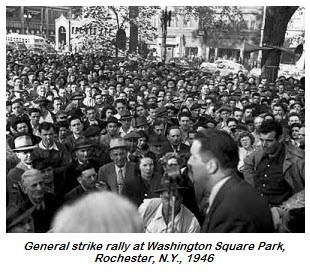 At least 30,000 workers in Rochester, N.Y., participate in a general strike in support of municipal workers who had been fired for forming a union – 1946
At least 30,000 workers in Rochester, N.Y., participate in a general strike in support of municipal workers who had been fired for forming a union – 1946
May 29
Animators working for Walt Disney begin what was to become a successful 5-week strike for recognition of their union, the Screen Cartoonists’ Guild. The animated feature Dumbo was being created at the time and, according to Wikipedia, a number of strikers are caricatured in the feature as clowns who go to “hit the big boss for a raise” – 1941
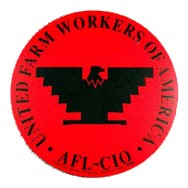 A contract between the United Mine Workers and the U.S. government establishes one of the nation’s first union medical and pension plans, the multi-employer UMWA Welfare and Retirement Fund – 1946
A contract between the United Mine Workers and the U.S. government establishes one of the nation’s first union medical and pension plans, the multi-employer UMWA Welfare and Retirement Fund – 1946
The United Farm Workers of America reaches agreement with Bruce Church Inc. on a contract for 450 lettuce harvesters, ending a 17-year-long boycott. The pact raised wages, provided company-paid health benefits to workers and their families, created a seniority system to deal with seasonal layoffs and recalls, and established a pesticide monitoring system – 1996
UAW members at General Motors accept major contract concessions in return for 17.5 percent stake in the financially struggling company – 2009
May 30
The Ford Motor Company signs a “Technical Assistance” contract to produce cars in the Soviet Union, and Ford workers were sent to the Soviet Union to train the labor force in the use of its parts. Many American workers who made the trip, including Walter Reuther, a tool and die maker who later was to become the UAW’s president, returned home with a different view of the duties and privileges of the industrial laborer – 1929
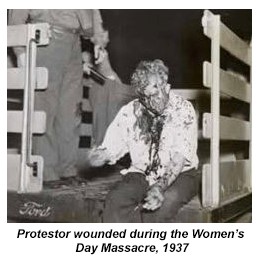 In what became known as the Memorial Day Massacre, police open fire on striking steelworkers at Republic Steel in South Chicago, killing ten and wounding more than 160 – 1937
In what became known as the Memorial Day Massacre, police open fire on striking steelworkers at Republic Steel in South Chicago, killing ten and wounding more than 160 – 1937
The Ground Zero cleanup at the site of the World Trade Center is completed three months ahead of schedule due to the heroic efforts of more than 3,000 building tradesmen and women who had worked 12 hours a day, seven days a week for the previous eight months – 2002
May 31
 The Johnstown Flood. More than 2,200 die when a dam holding back a private resort lake burst upstream of Johnstown, Pennsylvania. The resort was owned by wealthy industrialists including Andrew Carnegie and Henry Clay Frick. Neither they nor any other members of the South Fork Fishing and Hunting Club were found guilty of fault, despite the fact the group had created the lake out of an abandoned reservoir – 1889
The Johnstown Flood. More than 2,200 die when a dam holding back a private resort lake burst upstream of Johnstown, Pennsylvania. The resort was owned by wealthy industrialists including Andrew Carnegie and Henry Clay Frick. Neither they nor any other members of the South Fork Fishing and Hunting Club were found guilty of fault, despite the fact the group had created the lake out of an abandoned reservoir – 1889
Some 25,000 White autoworkers walk off the job at a Detroit Packard Motor Car Co. plant, heavily involved in wartime production, when three Black workers are promoted to work on a previously all-White assembly line. The Black workers were relocated and the Whites returned – 1943
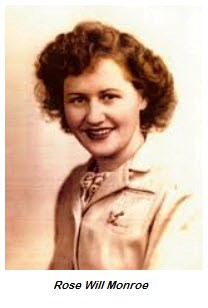 Rose Will Monroe, popularly known as Rosie the Riveter, dies in Clarksville, Ind. During WWII she helped bring women into the labor force – 1997
Rose Will Monroe, popularly known as Rosie the Riveter, dies in Clarksville, Ind. During WWII she helped bring women into the labor force – 1997
June 01
The Ladies Federal Labor Union Number 2703, based in Illinois, was granted a charter from the American Federation of Labor. Women from a wide range of occupations were among the members, who ultimately were successful in coalescing women’s groups interested in suffrage, temperance, health, housing and child labor reform to win state legislation in these areas – 1888
Union Carpenters win a 25¢-per-day raise, bringing wages for a 9-hour day to $2.50 – 1898
Congress passes the Erdman Act, providing for voluntary mediation or arbitration of railroad disputes and prohibiting contracts that discriminate against union labor or release employers from legal liability for on-the-job injuries – 1898
Nearly 3,500 immigrant miners begin Clifton-Morenci, Ariz., copper strike – 1903
Some 12,500 longshoremen strike the Pacific coast, from San Diego to Bellingham, Wash. Demands included a closed shop and a wage increase to 55¢ an hour for handling general cargo – 1916
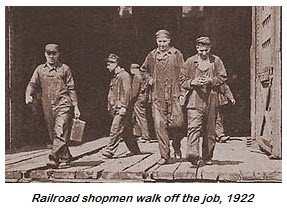 As many as 60,000 railroad shopmen strike to protest cuts in wages – 1922
As many as 60,000 railroad shopmen strike to protest cuts in wages – 1922
Extinguishing the light of hope in the hearts and aspirations of workers around the world, the Mexican government abolishes siestas—a mid-afternoon nap and work break which lengthened the work day but got people through brutally hot summer days – 1944
Farm workers under the banner of the new United Farm Workers Organizing Committee strike at Texas’s La Casita Farms, demand $1.25 as a minimum hourly wage – 1966
Dakota Beef meatpackers win 7-hour sit-down strike over speed-ups, St. Paul, Minn. – 2000
General Motors filed for Chapter 11 bankruptcy. The filing made the automaker the largest U.S. industrial company to enter bankruptcy protection. It went on to recover thanks to massive help from the UAW and the federal government – 2009
June 02
Twenty-six journeymen printers in Philadelphia stage the trade’s first strike in America over wages: a cut in their $6 weekly pay – 1786.
A constitutional amendment declaring that “Congress shall have power to limit, regulate, and prohibit the labor of persons under eighteen years of age” was approved by the Senate today, following the lead of the House five weeks earlier. But only 28 state legislatures ever ratified the amendment—the last three in 1937—so it has never taken effect – 1924
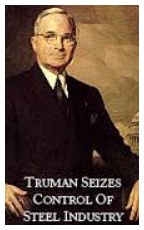 The U.S. Supreme Court rules that President Harry Truman acted illegally when he ordered the Army to seize the nation’s steel mills to avert a strike – 1952
The U.S. Supreme Court rules that President Harry Truman acted illegally when he ordered the Army to seize the nation’s steel mills to avert a strike – 1952
Amalgamated Clothing Workers of America and Textile Workers Union of America merge to form Amalgamated Clothing & Textile Workers Union – 1976
June 03
Int’l Ladies Garment Workers Union founded – 1900
A federal child labor law, enacted two years earlier, was declared unconstitutional – 1918
More than 1,000 Canadian men, working at “Royal Twenty Centers” established by the Canadian government to provide work for single, unemployed homeless males during the Great Depression, begin an “On to Ottawa Trek” to protest conditions at the camps. They were being paid 20 cents a day plus food and shelter to build roads, plant trees and construct public buildings – 1935
The National Labor Relations Board rules that tribal governments and their enterprises are subject to federal labor law – 2004
– Compiled and edited by David Prosten.
